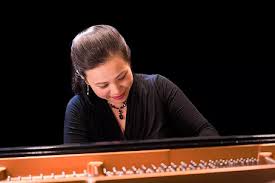by Nicholas Stevens

During her May 6 concert at Pilgrim Church, Yudha often addressed the audience directly. To open the program, she dedicated her performance of Bach’s aria Sheep May Safely Graze from Cantata No. 208 to the coming occasion of Mother’s Day. Yudha pulled a brilliant sound, almost like that of a music box, from the upper octaves of the piano. The difference between these high, bright tones and Yudha’s warm, connected left-hand lines registered as the divergent roles of sheep and shepherd: one joyful and carefree, the other cradling, guiding, and gently supporting.
Bach’s Partita No. 1 followed, with the Prelude alternately flowing by in waves and tripping along in the clipped, crisp fashion of a harpsichord. The quick tempo Yudha chose for the Allemande gave the movement energy, though it also resulted in some blurring of the counterpoint. In terms of volume and energy level, the Courante took the shape of a plateau: rising to a rollicking pace quickly, it then fell away at the end. The innocuous Sarabande led to a more engaging pair of Minuets, the first bustling and the second more reflective. The hand-crossing Gigue flew by.
Robert Schumann’s Sonata No. 2 found Yudha excelling in the Romantic style, her performance full of longing, drama, and tension. Highlights included the angst-ridden hesitations of the first movement’s latter half, and the abrupt, dissonant chord near the end of the finale, which announces the gloomy composition’s final descent into the void.
Yudha once again made the most of her strong left-hand technique in Robert Casadesus’s Variations After “Hommage à Debussy” by Manuel de Falla, a tribute to a tribute that demands power and authority — both abundant in this performance.
Henri Dutilleux’s Blackbird, a piece that imitates birdsong, served as an entry point for a suite by the composer titled Au gré des ondes (“Along the Waves”), a reference to its movements’ original use as filler material during breaks in radio broadcasts. Yudha selected four of these, beginning with the beautiful but unsettling Prélude en berceuse. Claquettes is a fun, forgettable piece, but Yudha made a strong case for the Hommage à Bach that follows it.
Two movements from the late Slamet Abdul Sjukur’s GAME-Land no. 5 served as both logical next steps and refreshing departures. Sjukur studied with Dutilleux and Olivier Messiaen in Paris, and one can hear their influence in the second movement, La Riviere, The River, Sungai. Yudha, a student of Sjukur, expertly handled its three distinct layers of musical motion — slow bass, restless middle, chiming high end. But the movement that preceded it, L’Ecoute Réduite, Listening Without Prejudice, Biarkan Bunyi Berbicara Sendiri, was the program’s greatest adventure. Yudha, standing beside the piano with a microphone and an Indonesian kemanek drum, clapped, recited, clucked, and tapped her way through a magnetic solo performance seemingly as far from Bach as possible.
The final piece collapsed the distance between the Western canon and the music of the Indonesian Gamelan. In an awe-inspiring rendition of Claude Debussy’s L’Isle joyeuse that brought the audience to its feet, Yudha played a piece from the grand old French piano tradition that draws much of its appeal from its composer’s incorporation of ideas from the Gamelan. Centuries of age and oceans’ worth of distance were no match for this pianist, who with ambitious vision and technical expertise gathered all this music into a cohesive spring bouquet.
Published on ClevelandClassical.com May 15, 2018.
Click here for a printable copy of this article



